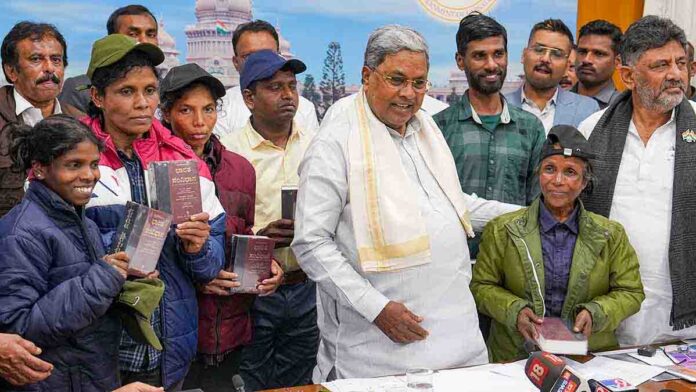AGENCY
NEW DELHI, Feb 3
Two more Naxals from Karnataka: Kotehonda Ravindra (44) from Kigga village in Sringeri and Thombattu Lakshmi alias Lakshmi Poojarthi (41) from Kundapura, surrendered before the district administrations in Chikmagalur and Udupi, respectively, last week. Ravindra, who has been part of the Naxalite movement in Karnataka for the past 18 years, has 27 cases registered against him and is classified as “A category” Naxalite as per the new Naxal surrender policy that came into effect on March 14, 2024. “Ravindra is eligible for a package of Rs 7.5 lakh (to be paid in instalments). He would also get a monthly stipend of Rs 5,000 if he opts for skill development training,” said Deputy Commissioner Meena Nagaraj. Lakshmi, who surrendered before Udupi Deputy Commissioner Vidya Kumari K, has three cases filed against her. On January 8, six Naxals – Latha Mundagaru, Vanajakshi Balehole, Sundari Kuthlur, Mareppa Aroli, K. Vasantha (Tamil Nadu) and T.N. Jisha (Wayanad), surrendered before Chief Minister Siddara-maiah in Bengaluru. The surrender spree is being attributed to the new policy of the Siddaramaiah government, which is said to be “encouraging” to the Naxals to give up their arms. So, what does the new policy offer to the Naxals who are willing to surrender?
What does policy say?
The revised Naxal Surrender and Rehabilitation Policy is meant for leftwing extremists and terrorists (as described under the UAP Act of 1967) and allows the Naxals to surrender with or without arms (weapons). The Naxalites are categorised under three categories: Category A – Armed Naxals who had been in hiding, belong to Karnataka and have one or more cases against them; Category B – Members of armed groups from outside Karnataka, with one or more cases against them; and Category C: Naxal supporters, sympathisers, keepers, couriers, informers and those with links to recruiters, who have been charge-sheeted in one or more criminal cases.
The surrendered Naxal will be eligible for a rehabilitation package from Rs 2 lakh – Rs 7.5 lakh, in three instalments, based on the category. However, the surrendered Naxal has to cooperate and reveal their names and disclose the Naxalite activities, weapon supply network, help identify other Naxals and the cases they are involved in, after giving a public statement of his surrender before the media.
A monthly stipend of Rs 5,000 will be given to those who enrol for skill development training at a recognised centre for one year, and those pursuing formal education can avail it for two years. Naxals surrendering their weapons will get incentives based on the sophistication and the number of arms and ammunition they deposit with the government. The Naxals in Karnataka had demanded that they should be treated with respect on surrender and not as criminals. They had concerns over surrendered Naxals rotting in jail and urged the government to drop minor cases, expedite the trial (by setting up a special court), hold talks with Kerala and Tamil Nadu governments about the cases, facilitate bail (by not opposing bail plea), order a judicial inquiry into Vikram Gowda’s encounter killing, besides taking steps to fulfil their 18-point charter of demands concerning the problems faced by oppressed communities.
While the surrendered Naxals will be required to fight the cases related to serious offences (under the Arms Act and UAPA), the state cabinet has the discretion to drop the minor cases to enable their reintegration into the mainstream.
The state has witnessed more than eight encounters of Naxals and an equal number of killings (both civilians and police) by the extremists; 22 Naxalites have surrendered over the last two and a half decades. Many Naxals have died in wild elephant attacks in the forests, and some others have surrendered or have been arrested in outside states. With Lakshmi Thombattu’s surrender, the state is “Naxal-free” for now as all the known Naxalites have surrendered.
Said advocate and Surrender Committee member K.P. Sripa: “The surrendered Naxals have more than 250 cases filed against them in Karnataka, Tamil Nadu and Kerala. The past experience tells us we need to form dedicated teams to pursue the cases and ensure their speedy disposal, and follow up with the government to get their rehab package as they don’t have a bank account or Aadhar card. Our priority is to get them out of jail on bail as it makes their reintegration easier. They are poor, and a majority belong to the Malekudiya (tribal) community and need free legal services too.”



























